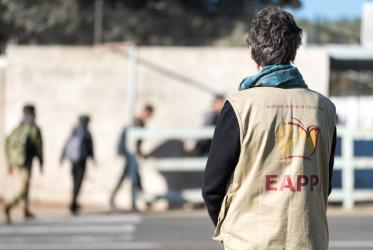A crane began lowering 12-meter concrete slabs into place in the Cremisan Valley, near Bethlehem in occupied Palestine on 6 April, marking the final phase of construction of an extension to the Israeli separation barrier. The World Council of Churches, through its Ecumenical Accompaniment Programme in Palestine and Israel (EAPPI), has been alongside the affected Palestinian community in the valley, both Christian and Muslim, throughout their legal struggle to stop the construction.
Just a year ago, it seemed like a good day for Palestinians and for Christians in the Holy Land, says Katherine, a British Ecumenical Accompanier currently serving with EAPPI in Bethlehem. “The Israeli Supreme Court ruled against plans by the Israeli military to take 75% of the convent’s land in the Cremisan Valley, surround it on three sides by the 12-meter high separation barrier, divide it from the neighbouring monastery, deprive 58 Palestinian Christians of their land and prevent over 400 families from accessing their land without a permit. However, just four months later, the Israeli courts ruled that their decision only applied to plans affecting the monastery and convent and not to the other landowners.”
Days after that court decision, the Israeli military arrived without warning to uproot the thousand-year-old olive trees in the valley in advance of the barrier’s construction. They came while daily ecumenical prayers were taking place among the olive trees, organized by local churches to protest at the illegal confiscation of their land and pray for protection for the trees. A Methodist minister present described how they continued around the destruction: “Normally when we say the Lord’s Prayer together in English and Arabic, those saying it in English finish first. But on this day as we prayed while bulldozers uprooted olives trees that were older than the time of Christ, no one was able to finish the words of the prayer, we were so overcome with sadness.”
Landowners held regular peaceful protests and local churches held regular services on the site in August and September 2015 to draw attention to the confiscation of the land. But after the Israeli military used teargas to disperse those gathering for the services, the organizers felt they could no longer continue. “Without this focus point,” Katherine says, “interest from around the world began to wane.”
Following a legal appeal by the affected communities, on 30 January 2016 an Israeli court ruled that construction could continue for security reasons. The ruling contradicted the International Court of Justice’s 2004 Advisory Opinion which stated that construction of the barrier on Palestinian land breached article 53 of the Fourth Geneva Convention and could not be justified for security reasons.
“Throughout February, March and April we have seen construction of the barrier happen before our eyes,” Katherine says. “But nothing prepared me for the impact of seeing those first concrete slabs go in and divide the valley in two. It is not until you stand under them that you experience the fear and separation the wall creates”.
Issa, a Palestinian Christian and one of the landowners whose olive trees were destroyed, told Katherine of his concern that the extension of the separation barrier would speed up the already increasing emigration of Christians from the Holy Land. “We are the living roots and soon there will be no Christians left in the birth place of Christ,” he said.
The Latin Patriarchate of Jerusalem has publicly expressed its “profound disappointment” over the continuation of the construction work, calling it “a violent offense against the peace process”.
The WCC’s Ecumenical Accompaniment Programme in Palestine and Israel is urging Christians around the world to write to their elected representatives and foreign ministers asking them to put pressure on the government of Israel to:
- immediately stop the construction of the separation barrier through the Cremisan Valley,
- dismantle the sections of the barrier already constructed on all occupied Palestinian territory, and
- replant the uprooted olive trees and compensate farmers who have lost their trees.









